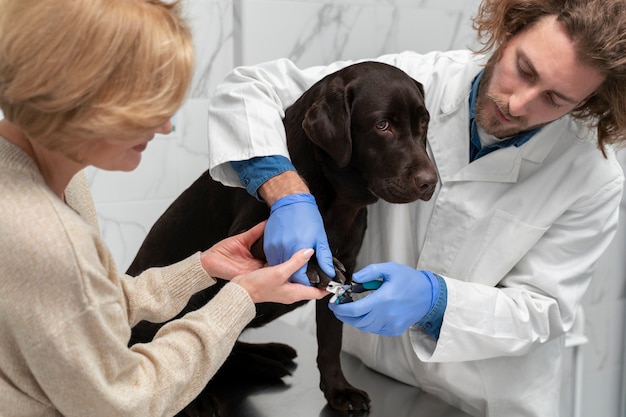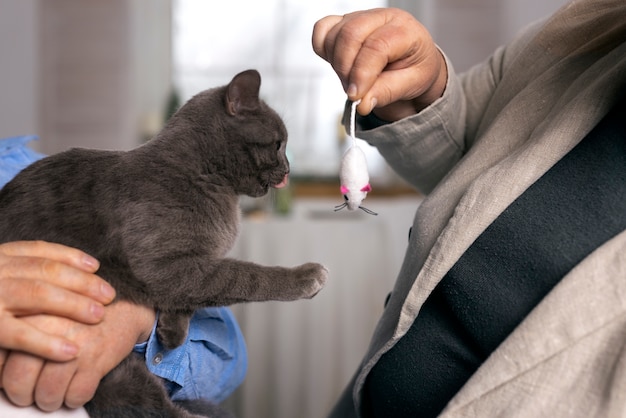What to Expect: Pet Laceration Repair Surgery at an Urgent Care Clinic

What to Expect: Pet Laceration Repair Surgery at an Urgent Care Clinic
When your pet suffers an unexpected cut or deep wound, the worry can be overwhelming. You may find yourself searching for immediate answers about what needs to happen next. If your dog or cat has a laceration that requires urgent attention, knowing what to expect from pet laceration repair surgery at an urgent care clinic can help ease your concerns. At VetCheck Pet Urgent Care Center - Lutz, located at 1809 Collier Parkway, Lutz, FL 33549, we understand how stressful pet emergencies can be. That’s why our veterinary professionals are here for you when your regular veterinarian may not be available, including evenings and weekends, and walk-ins are always welcome.
In this guide, we’ll walk you through how we handle pet laceration repair surgery in Lutz, what happens during the process, how we manage your pet’s pain and comfort, and what you can expect during recovery. Whether you are a local resident or searching for an emergency pet surgery Lutz, our goal is to provide you with the information you need to make confident decisions for your pet’s health. You will also find guidance on identifying when a laceration needs urgent care and how to support your pet’s healing at home. To learn more about our surgical wound and laceration care, you can visit our dedicated laceration repair surgery page for additional details.
Recognizing When Your Pet Needs Laceration Repair Surgery
It’s not uncommon for pets to experience minor scrapes or scratches, especially if they are active or curious. However, there are situations when a wound is far more serious and requires immediate veterinary intervention. Knowing when a pet laceration is an emergency can make all the difference in their outcome.
Key symptoms indicating your pet may need urgent care include bleeding that won’t stop after several minutes of gentle pressure, a wound that is deeper than a superficial scrape, or visible muscle, fat, or bone. Additional warning signs are wounds that are jagged, contaminated with dirt or debris, or appear to be causing significant pain or swelling. If your pet is limping, refusing to use a limb, or seems lethargic after sustaining a wound, these can be signs of a more severe injury. Infections can also develop quickly, so if you notice discharge, foul odor, heat, or redness around the wound, it’s time to seek help.
Scenarios that often lead to emergency pet surgery Lutz include pets getting caught on fences, being bitten by other animals, or suffering injuries from accidents. In Florida’s active communities, sharp landscaping, broken glass, and wildlife encounters can also cause lacerations that need prompt attention. Because the risk of infection and further complications rises quickly, it’s always best to err on the side of caution and bring your pet in for an evaluation by a veterinary professional.
Understanding the Causes of Pet Lacerations
Pet lacerations can happen for a variety of reasons. In Lutz and surrounding areas, active lifestyles and outdoor play often put pets at risk. Common causes involve encounters with other animals resulting in bites, sharp objects like sticks or metal, broken glass on walks, or even household accidents such as catching a paw in a door. In some cases, pets may experience lacerations during rough play or while exploring densely vegetated areas where thorns or branches can tear the skin.
Other factors that contribute to the severity of a laceration are the location and depth of the wound. Injuries to highly vascular areas like the face, paws, or tail tend to bleed more and can become infected more easily. Additionally, wounds sustained in contaminated environments—such as muddy yards, bodies of water, or areas where wildlife roam—carry a higher risk of infection and may require more extensive surgical cleaning.
For pet owners in Lutz and neighboring communities, the subtropical climate is another consideration. High humidity and warmth can accelerate bacterial growth, making even small wounds prone to infection. Because of these local conditions, prompt veterinary evaluation is especially important for any pet laceration that seems more than superficial.
What Happens During Pet Laceration Repair Surgery in Lutz
When you arrive at VetCheck Pet Urgent Care Center - Lutz, our veterinary team will triage your pet immediately. Since no appointment is needed and walk-ins are welcome, you will not have to wait for a scheduled time slot. We begin with a thorough physical exam and, when appropriate, utilize in-house diagnostics such as bloodwork or imaging to assess your pet’s overall health and the extent of the injury. This allows us to determine the safest anesthesia protocol and identify any underlying issues that might affect healing.
The laceration repair itself involves several key steps. First, the wound is cleaned and any debris, dead tissue, or foreign material is carefully removed. In cases where the wound is heavily contaminated or more than a few hours old, we may flush the area with sterile solutions and trim away damaged tissue to prevent infection. Pain management is a top priority, so your pet will receive appropriate sedation or anesthesia to ensure they are comfortable throughout the procedure.
Once the wound is clean, our veterinarians use specialized techniques to close the laceration. Depending on the depth and location, this may involve multiple layers of sutures to restore both the underlying tissue and the skin surface. Some wounds may require drains to allow fluid to escape during early healing. If the wound is located near a joint or an area under tension, special suture patterns may be used to provide extra support. After closure, the area is cleaned again and a bandage or protective covering may be applied to keep the wound clean.
During the entire process, our veterinary professionals monitor your pet’s vital signs and comfort closely. Pain medications and antibiotics are administered as needed to manage discomfort and reduce the risk of infection. We discuss the procedure with you before and after surgery so you know exactly what to expect and how to care for your pet once you return home. For more details about our procedures and expertise in soft tissue injuries, you can read about our soft tissue surgery services.
Pain Management and Recovery After Emergency Pet Surgery Lutz
Your pet’s comfort and safety are our top priorities, both during and after laceration repair surgery. Immediately following surgery, pets are monitored in our hospital for as long as needed. We use multimodal pain management strategies, which means we may combine injectable pain relief, oral medications, and local anesthetics to keep your pet comfortable during recovery.
Once your pet is stable and ready to go home, we provide clear instructions for home care. Typical recommendations include administering prescribed pain medications and antibiotics as directed, keeping the wound clean and dry, and preventing your pet from licking or chewing at the sutures. We may recommend the use of an Elizabethan collar (cone) or other protective devices to prevent self-trauma. Observation for signs like swelling, redness, discharge, or sudden changes in your pet’s behavior is crucial, as these can indicate complications.
Healing times vary depending on the size and location of the wound, as well as your pet’s overall health. Most pets begin to feel better within a few days, but sutures generally remain in place for 10 to 14 days. During the recovery period, limited activity is often advised to avoid putting stress on the healing tissue. If you have any concerns or notice changes in your pet’s condition, we encourage you to return for a recheck or call our veterinary team for guidance.
Preventing Pet Lacerations and Supporting Healing at Home
While accidents can happen to even the most cautious pet owners, there are steps you can take to reduce the risk of lacerations. Keeping your yard and home clear of sharp objects, supervising outdoor play, and using a leash in unfamiliar areas can help prevent injuries. Regular grooming is important as well, since matted fur can hide wounds and make it harder to spot injuries early.
If your pet does sustain a minor scrape or cut, immediate first aid at home involves gently cleaning the area with saline or clean water and applying gentle pressure to stop any bleeding. Avoid using hydrogen peroxide or alcohol, as these can irritate the tissue and delay healing. Monitor the wound closely for signs of infection or worsening. However, for any wound that is deep, bleeding heavily, or appears to be more than a simple abrasion, prompt professional evaluation is essential.
Supporting your pet’s healing after surgery involves following all post-operative care instructions from your veterinarian. This includes administering medications on schedule, limiting activity, and keeping the wound site protected. Providing a quiet, comfortable resting place can also help your pet recover more quickly. Remember, even with the best home care, some wounds can develop complications that need prompt intervention.
When to Seek Immediate Veterinary Care for Pet Lacerations
Time is critical when it comes to pet lacerations. If your pet is bleeding excessively, if the wound is gaping or exposing deeper tissues, or if your pet seems to be in significant pain, immediate veterinary attention is required. Wounds that involve the eyes, mouth, joints, or chest should always be treated as emergencies. Additionally, if you notice signs of shock—such as pale gums, rapid breathing, or collapse—bring your pet to the clinic without delay.
At VetCheck Pet Urgent Care Center - Lutz, our doors are open for walk-ins and there is no need to wait for an appointment. We are here for you during evenings, weekends, and whenever your primary veterinarian is unavailable. Our team of veterinarians is equipped to handle urgent pet care needs, from laceration repair surgery to other emergency soft tissue procedures. If you are unsure whether your pet’s wound needs immediate care, it is always better to err on the side of caution. You can learn more about our emergency and urgent care services and what conditions we treat on our website.
Compassionate, Immediate Care for Pet Lacerations in Lutz
When your pet faces a sudden injury, you deserve a veterinary team that responds quickly, keeps you informed, and puts your pet’s comfort first. At VetCheck Pet Urgent Care Center - Lutz, we specialize in urgent pet care—including pet laceration repair surgery in Lutz and surrounding communities. Walk-ins are always welcome and no appointment is needed, so you can count on us for help when you need it most. If you find yourself searching for an "emergency vet near me," rest assured our veterinary professionals are ready to provide timely treatment for your pet.
Whether you are dealing with a fresh wound or complications from a recent injury, our laceration repair surgery and emergency veterinary care services ensure your pet receives the highest level of attention. We are dedicated to the health and wellbeing of pets in Lutz and the surrounding area, and we are committed to being your reliable resource for emergency pet surgery Lutz.
If your dog or cat needs urgent pet laceration repair surgery in Lutz, do not wait—bring them to 1809 Collier Parkway, Lutz, FL 33549. For questions or directions, call us at (813) 501-5811. Our veterinary team is always here to help, providing compassionate and immediate care when your pet needs it most.
Disclaimer: The information provided in this blog is for educational purposes only and should not replace professional veterinary care. If you are concerned about your pet’s health or believe they require urgent medical attention, please contact our veterinary professionals or bring your pet to the clinic right away. For further reading on pet wound care and surgery, you may find the American Veterinary Medical Association wound care guidelines helpful.



















